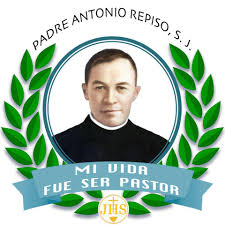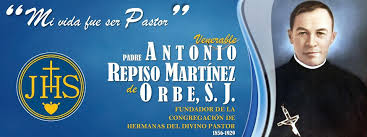July 27th: Servant of God - Anthony Pepiso Martinez, SJ
Born : February 8, 1856
Died : July 27, 1929
 Fr Anthony Repiso was born in Venta de Cordoba, a small town, twenty-five miles from Mexico City, on the main road to Pueblo. He was the fifth and youngest child – an only son – of his father’s first marriage. The family moved to Mexico City as the parents wanted to give their children a good education.
Fr Anthony Repiso was born in Venta de Cordoba, a small town, twenty-five miles from Mexico City, on the main road to Pueblo. He was the fifth and youngest child – an only son – of his father’s first marriage. The family moved to Mexico City as the parents wanted to give their children a good education.
Anthony entered the diocesan minor seminary in Mexico City in 1870 at fourteen, much against the will of his father, two years after the death of his mother. His father had hoped that Anthony would succeed him as a farm manager and carry on the family’s name but he couldn’t be persuaded. Anthony started seminary life as a day student, returning home for the noon meal after his morning classes and then back to school until 5.00 p.m. In 1873, when he was about to begin his philosophy, his family moved to Iztacalco (now part of Mexico City), further away from the seminary and without public transportation, Anthony had to walk about two miles to and from school each day. He had to leave before six in the morning and returned home at eight in the evening. He was given a scholarship for his theology in 1876 and was given free boarding in the seminary and returned home only during vacations.
Anthony was ordained on March 20, 1881 and his pastoral assignment was as assistant at Our Lady of Guadalupe parish in Villa de Guadalupe, the first of five parishes he served for a total of twelve years before becoming a Jesuit. With the archbishop’s knowledge and approval, he requested admission into the Society. This was granted and he entered the novitiate at San Simon near Zamora on August 14, 1893 at the age of thirty-seven. Although Fr Repiso was an experienced pastoral worker, he blended in perfectly with the younger novices and had no difficulty in sharing their humble chores about the house. After his first vows he spent the next two years brushing up on his reading in moral theology.
Fr Repiso was assigned to the Jesuit residence in Oaxaca and it was there that he later sought approval from his provincial to found a congregation known as Sisters of the Divine Shepherd based on the rules of the Society and imbued it with Ignatian spirituality where young girls from low income families could join as religious. However two years after founding and guiding the young congregation, his superiors thought it prudent to distance him from it and he was transferred to Puebla in 1902.
 While in Oaxaca, Fr Repiso was granted his request to have a share of Our Lord’s Passion. When one of his young sodalists was dying, he sat next to her bed and told her: “Daughter, when you arrive in heaven, tell our Lord to send me something so that I may imitate Him in His passion.” The young girl died and sometime later, Fr Repiso found a pimple on his left shoulder which gradually grew in size until the open wound covered a good portion of the left side of his back. In 1924 when a physician suggested treatment of the wound, Fr Repiso replied that he couldn’t possibly ask the Lord to relieve him of it since the Lord had granted it to him at his own request.
While in Oaxaca, Fr Repiso was granted his request to have a share of Our Lord’s Passion. When one of his young sodalists was dying, he sat next to her bed and told her: “Daughter, when you arrive in heaven, tell our Lord to send me something so that I may imitate Him in His passion.” The young girl died and sometime later, Fr Repiso found a pimple on his left shoulder which gradually grew in size until the open wound covered a good portion of the left side of his back. In 1924 when a physician suggested treatment of the wound, Fr Repiso replied that he couldn’t possibly ask the Lord to relieve him of it since the Lord had granted it to him at his own request.
Fr Repiso was assigned to Chihuahua in 1904 after he completed his tertianship to take care of the local shrine of Our Lady of Guadalupe which the bishop had given to the care of the Society. When Fr Repiso took over, the attendance at Sunday Mass numbered only fifteen. A year later he had a thousand on Communion Sundays. After a year Fr Repiso was again transferred to Nonoava in Sierra Tarahumara and remained there for fifteen years. He concentrated on his flock’s spiritual growth, promoted the Ignatian Spiritual Exercises, the Apostleship of Prayer and established sodalities for girls from which many vocations came.
He was appointed superior pf the residence in Leon in 1923 and the following year the Church suffered systematic persecution under the rabid anti-Catholic Plutarco Elias Calles who became president of Mexico.
 The president limited the number of priests that could minister in each area and a new penal code against the Catholic Church was promulgated. The Mexican bishops’ response to the government’s excessive restrictions led to the suspension of all Church services in the country and the dissolution of all religious communities resulting in priests having to live in private homes. The priests had to risk their lives to minister to the faithful in secret.
The president limited the number of priests that could minister in each area and a new penal code against the Catholic Church was promulgated. The Mexican bishops’ response to the government’s excessive restrictions led to the suspension of all Church services in the country and the dissolution of all religious communities resulting in priests having to live in private homes. The priests had to risk their lives to minister to the faithful in secret.
When the churches reopened in 1929, Fr Repiso’s health no longer permitted him to be active. In addition to the large cancerous wound on his back which caused him constant pain, he also suffered from hernia and hemorrhoids. Fr Repiso became gravely ill in July 1927, and on Saturday, July 27 at 10.45 p.m., after reciting the Ignatian prayer Take and Receive, Fr Repiso surrendered his soul to the Lord. His cause is presently under consideration.
